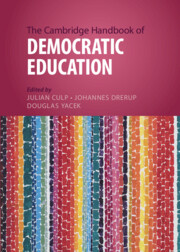Book contents
- The Cambridge Handbook of Democratic Education
- Cambridge Handbooks in Education
- The Cambridge Handbook of Democratic Education
- Copyright page
- Contents
- Contributors
- Acknowledgments
- Introduction
- Part One Historical Perspectives
- Part Two Philosophical and Normative Foundations
- Part Three Key Topics and Concepts
- 16 Educational Justice and Democratic Education
- 17 Global Justice and Democratic Education
- 18 Debate and Deliberation in Democratic Education
- 19 Agonistic Democracy and the Question of Education
- 20 Punishment and Democratic Education
- 21 Children’s Rights and Democratic Education
- 22 Education, Trust, and the Conversation of Democracy
- 23 Patriotism and Democratic Education
- 24 The Voice of Poetry in Cultivating Cosmopolitan and Democratic Imagination
- 25 Disability and Democratic Education
- Part Four Challenges
- Index
- References
16 - Educational Justice and Democratic Education
from Part Three - Key Topics and Concepts
Published online by Cambridge University Press: 20 April 2023
- The Cambridge Handbook of Democratic Education
- Cambridge Handbooks in Education
- The Cambridge Handbook of Democratic Education
- Copyright page
- Contents
- Contributors
- Acknowledgments
- Introduction
- Part One Historical Perspectives
- Part Two Philosophical and Normative Foundations
- Part Three Key Topics and Concepts
- 16 Educational Justice and Democratic Education
- 17 Global Justice and Democratic Education
- 18 Debate and Deliberation in Democratic Education
- 19 Agonistic Democracy and the Question of Education
- 20 Punishment and Democratic Education
- 21 Children’s Rights and Democratic Education
- 22 Education, Trust, and the Conversation of Democracy
- 23 Patriotism and Democratic Education
- 24 The Voice of Poetry in Cultivating Cosmopolitan and Democratic Imagination
- 25 Disability and Democratic Education
- Part Four Challenges
- Index
- References
Summary
This chapter offers an overview of some of the more important approaches to these questions in contemporary, mostly anglophone, conceptions of educational justice in primary and secondary education. Section 16.2 starts with some provisions of some important goals of education. Section 16.3 turns to educational justice in general. Section 16.4 asks about the spheres of educational justice: is it education and socialization in general, or the school system in particular? Section 16.5 distinguishes three different levels of education: basic education for all; the cultivation of individual talents and capacities; and selection for higher education and the job market. Section 16.6 outlines the differences between five principles of justice and equality in the field of education: strict equality; a conception of fair equality of opportunity, iii) a conception of luck-egalitarian equality of opportunity; iv) a prioritarian conception of educational justice; and democratic adequacy as a conception of educational justice.
Keywords
- Type
- Chapter
- Information
- The Cambridge Handbook of Democratic Education , pp. 263 - 280Publisher: Cambridge University PressPrint publication year: 2023

